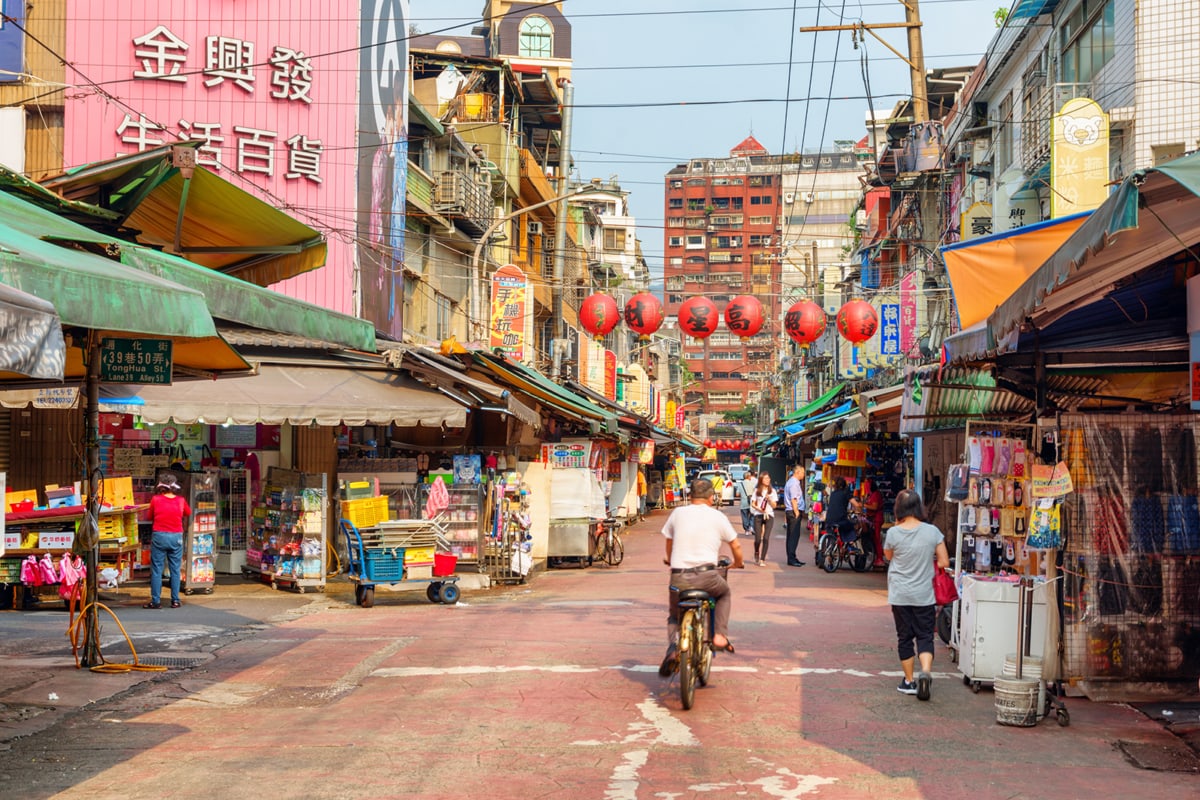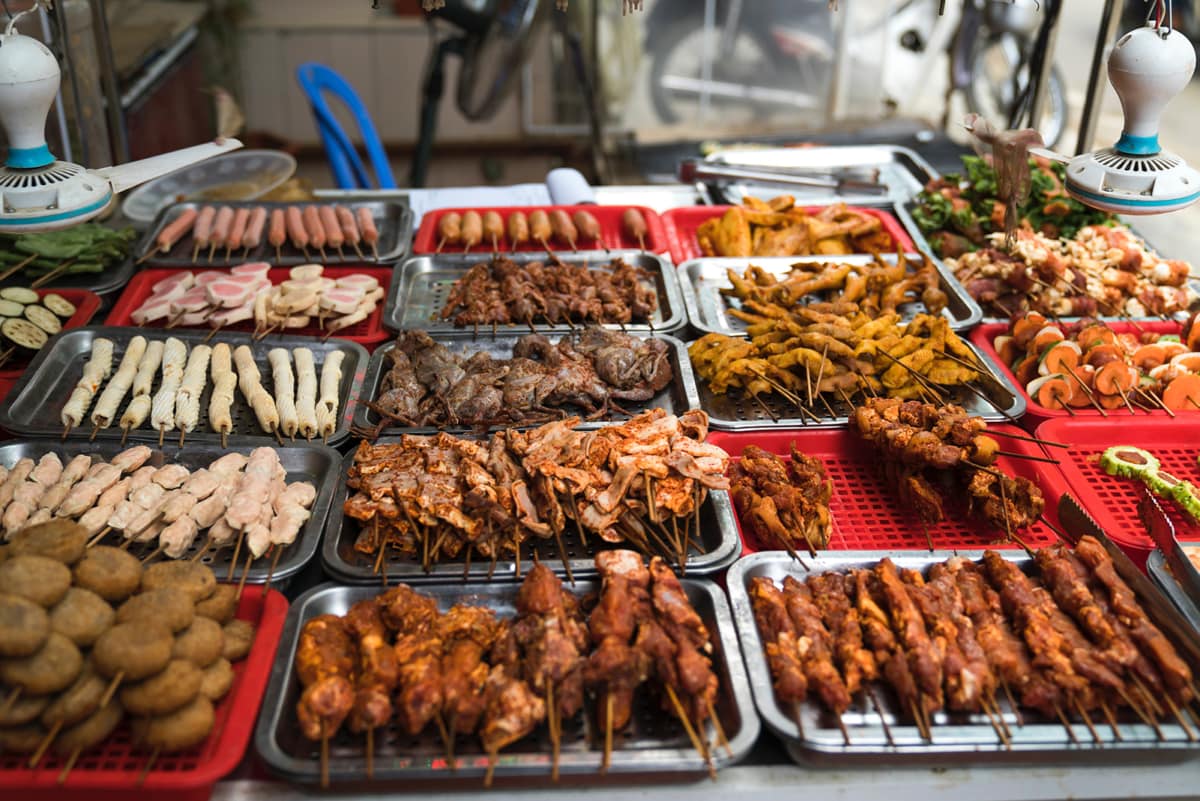Nervous about traveling in China? Don’t be! China’s ancient landmarks, friendly locals, and authentically delicious food will have you hooked. These China travel tips will help you have the best trip ever.
China Travel Tips: 20 Things to Know Before You Travel to China
Traveling to China can be an overwhelming and eye-opening experience. This spectacular country is brimming with ancient landmarks, friendly locals, and some of the best food your tastebuds will ever have the pleasure of tasting.
And while traveling China may but daunting to some, it’s actually fairly manageable, even for first-time travelers.
However, there are a few simple tips to keep in mind when traveling to China. Not only will these tips help you to make the most of your time, but they will also allow you to truly immerse yourself in China’s fascinating culture.
So, if you’ve never been to China before, take note of these tips and prepare to have your entire world turned upside down.
-
You Need a Visa to Enter China

As an American, you will need to obtain a visa before entering mainland China. All business travelers, students, permanent workers and even tourists will need to get a pre-approved visa.
You can apply for a 3 month, 6 month, or 1-year visa with single, double, or multiple entries. If you think you’ll return to China in the near future (and trust me—you will want to), then you can also ask for a 10-year visa.
It’s important to note that getting a visa to visit China takes a little bit of effort. You will either need to apply directly to one of the Chinese embassies or consulates in your country. In the US, the embassy is in Washington DC and the consulates are in Chicago, Houston, New York City, San Francisco, and Los Angeles.
But if you don’t live near one of the above embassy or consulates, then you can use a visa courier service to submit your passport on your behalf. You will mail your passport to the service and the people will get your visa for you in person.
If you are traveling to Hong Kong, then you do not need a visa for trips under three months. Any stays longer than three months will require a pre-approved visa from the China embassy.
-
Buy a VPN is Before You Arrive
Eager to upload your selfie in front of the Forbidden City? Want to prove to your friends that you ate the spiciest hot pot in all of Chengdu? If so, you’ll want to purchase a VPN.
China has a strict censorship policy, which means the government heavily regulates (and blocks) certain websites like Facebook, Wikipedia and even Google itself. A VPN, or virtual private network, will give you access to those sites when visiting China.
Not only is a VPN useful for staying in touch with friends and family, but it also allows you to read reviews, book hotels, and find activities to do during your trip to China. Essentially, having a VPN is one of the best tips I can give you!
So, if you want to post on social media or access your email during your vacation, then remember to purchase a VPN before traveling to China.
At just a few dollars a month, a VPN is the best way to overcome that infamous Chinese firewall. And while it’s not totally necessary, a VPN will definitely make your trip to China a whole lot easier! I recommend ExpressVPN.
-
Download WeChat Before You Travel to China
Although WeChat may not be known outside of China, downloading the app is one of the biggest China travel tips I can offer. Not only does it allow you to text, call and email your friends, but you can also pay for services and goods when you access their mobile payments platform.
In China, businesses, shops and some restaurants accept payment through WeChat. So if you’re wary about carrying tons of cash, paying through WeChat is a great option.
And with over 1 billion active users, it’s also one of the most popular apps in the entire world.
Don’t worry if you can’t speak or read Mandarin. WeChat offers an English interface so you can pay for everything from steamed pork buns to knock-off headphones.
-
Knowing Some Mandarin Goes a Long Way
Out of all these China travel tips, this one will make your trip a whole lot easier. The language barrier can be a big deal-breaker for many travelers heading to China. For this reason, you should try learning a few words in Mandarin so you can navigate and talk to people in China.
Even just a simple “Ni Hao” (hello) or “Xie Xie” (thank you) in the language will impress the locals. I have a few other China travel tips for picking up a new language, and I guarantee the effort will help you make the most of your trip.
If you don’t have time to learn beforehand, then you can always travel with a pocket dictionary or translator. You can also email your hotel if you need help writing down an address for a taxi driver.
As an English speaker, Mandarin Chinese may seem an incredibly hard language to speak, but it’s one of the most important ways to learn about the culture. Your effort will go a long way with the Chinese people. From my experience, they really appreciate it when foreigners try to speak to them.
-
Ready Yourself for Culture Shock

A simple street scene in China If you’ve never been to Asia before, then you might be in for a big culture shock when touring China. Even after living in China for a few months, I still find myself bewildered every time I return back to this amazing country.
And the truth is, you’ll probably be overwhelmed too. And guess what? That’s perfectly normal.
It’s okay if there are times where you feel overwhelmed by the size of the crowds or the unfamiliar writing on the plastered signs around the city. You might be uncomfortable because you can’t recognize the type of meat on the menu or be able to speak English to your taxi driver.
And you should be aware that people like to stare…a lot.
But don’t let these small unknown hurdles define your experience. It may seem strange at first, but learning about and immersing yourself in these differences is the best way to access Chinese culture.
-
There's No Avoiding a Game of Menu Roulette
One of the biggest perks of traveling in China is being able to eat traditional Chinese food. Whether you’re indulging in crispy Peking duck in Beijing or slurping down steamed soup dumplings in Shanghai, you’ll be treated to a wide variety of mouthwatering dishes.
But without being able to read or speak Mandarin, you might find yourself ordering a few mystery dishes off the menu. What looks, tastes and smells like chicken, well, might not be chicken at all.
But hey, if it looks good and people are eating it, why not sit back and enjoy?
And while most things are perfectly safe to eat, you should still be extra cautious when dining in China. Your stomach might not be prepared to handle the extra spice or unique ingredients that are used in Chinese cooking. To be extra safe, avoid raw vegetables or meats that have been left out in the sun for too long.
Nobody wants to leave halfway through their meal to make a beeline for the nearest public squat toilet.
-
Always Carry Toilet Paper. Always.
And speaking of urgent runs to the bathroom, you should always carry toilet paper while traveling in China.
Sure, it’s good to have something extra on hand when nature calls. But you should also be aware that most Chinese bathrooms don’t provide toilet paper. And in those desperate times of need, you’ll be thankful that you read these China travel tips.
Most high-end hotels and restaurants will have toilet paper. And although some local public bathrooms in China have small booths where you can purchase a few sheets, I wouldn’t take the risk.
One of my other tips is to check the main area of the bathroom (before you enter the stall). It’s possible that some restaurants and malls have rolls of paper there that you can take with you into the stall.
-
Learn to Haggle Like Your Life Depends on It
To remember your trip to China, you’ll probably want to take back a few unique souvenirs. After all, you are in the shopping capital of the world! And to make your dollar stretch even further, it’s important to remember a few simple tips.
When shopping in a local market or small store in China, always remember to haggle down the price. Shopkeepers tend to overcharge foreigners, and you can always get a better deal by mastering the art of bargaining. In fact, many Chinese people will find it rude or offensive if you accept their first offer without even trying to haggle!
From my experience, you can sometimes pay 50% to 75% less than what you are initially quoted. And if you purchase multiple items, you can probably ask for an even bigger discount.
Don’t act too eager, and if all else fails, then simply use the walk-away technique. If the shopkeeper really wants to make the sale, they’ll chase after you to give you a lower price.
-
China is an Affordable Destination!

China's waterways make for beautiful photography I won’t beat around the bush. China can be a very affordable place to travel, especially if you know about these China travel tips.
The cost of traveling in China depends on a number of factors. The cities you visit, the hotels you stay in, and the type of activities you participate in will significantly impact your travel budget.
But generally speaking, you can easily experience China on just $25 a day.
To cut down on costs, I recommend staying in shared dorm hostels, booking 2nd-class train tickets, and eating a variety of street snacks for meals. If you plan ahead of time, you can also save big by purchasing flights, hotels, and train tickets ahead of time, or during the off season.
Of course, this price will go up if you want to splurge on luxuries like taxis or private tours. And don’t forget to save some extra cash for souvenirs to take back home.
-
Cash is King
Although you may be used to paying for food or items with a credit card, this process is quite different in China. Here, cash is the main method of payment.
For this reason, you should always carry cash with you when you’re traveling or shopping in China. If you only have a credit card on you, then you might find yourself in a sticky situation, especially if you don’t speak the language.
Although some businesses will let you pay with WeChat, most street food vendors and taxis will only accept cash as legal tender.
On the other hand, hotels, international shops, and large restaurants will almost always give you the option to pay by card. However, some of these places only accept Chinese credit cards. If you only have a Visa or Mastercard, you might need to resort to paying the bill in cash there too.
-
The Easiest Way to Travel in China is by Train

As one of the largest countries on the planet, China may seem overwhelming at first. However, getting around this sprawling country is relatively easy, especially if you plan to travel by train.
China’s extensive rail system can be fast, efficient, and best of all, very affordable. And in many cases, the high-speed bullet trains will get you to your destination faster than most planes will. Saving time and money is the ultimate win-win situation in my book!
But, there are a few tips to keep in mind before you purchase tickets. If you’re traveling short distances, like Beijing to Shanghai, you can opt for a second-class seat, which is similar to economy class on an airplane. For longer trips, you should upgrade to first-class or business-class, which is far more luxurious and comfortable than sitting in second-class.
Remember, you might get stuck in a train car that is standing room only if you book tickets last minute. For this reason, I recommend purchasing your tickets far in advance.
You can book online at 12go.asia, one of the best sites for train tickets in China. They also offer tour information, email assistance and other tips in English that you might find helpful when visiting China.
-
Hotels in China Are Very Different

A bed this comfortable can't be beat! When visiting China, you’ll have a plethora of accommodation options to choose from. From mid-range hotels and hostels to traditional hutongs and homestays, there is something in China for every type of traveler.
However, Chinese hotels may be different than what you expect back home. For instance, some budget hotels might not have wifi and only have hot water in the shower at certain hours of the day.
Smoking is also allowed and is quite common in the lobby and even in private rooms. If you’re not a smoker, then I recommend requesting a non-smoking room upfront when checking in or making your reservation.
Big cities like Beijing, Shanghai and Hong Kong have a wider variety of options than the smaller villages in the countryside. And if you’re staying in a rural hotel that caters to Chinese locals, don’t expect the front desk receptionist to speak fluent English.
On the other hand, even budget and mid-range hotels offer some sort of free breakfast. However, the Chinese version of a continental breakfast can be very different than what you would expect in other countries too!
Of course, if you’re willing to shell out the big bucks, you can stay in a luxury hotel or resort with the comforts of a five-star western hotel. But in my opinion, the more authentic the accommodation, the better!
-
Tipping Isn't Always Expected
If you’re visiting from the US, you might instinctively add a 15% to 20% tip to your food bill. However, the tipping tradition is different in China. If you’re in a restaurant or hotel, tipping is not expected or required.
You’re also not required to tip taxi drivers. However, the locals probably won’t turn down an extra 10 or 20 RMB if there are times where you think they are providing excellent customer service. If you want to reward them for a good time, then feel free to leave them some extra cash for their hard work.
The only exception is in Hong Kong. Most people that working the hotel will expect a tip for carrying your luggage or valeting your car. And at a restaurant, there are times where a 10% service charge is automatically added to the final dinner bill.
-
You CAN Eat Chinese Street Food Without Getting Sick—And It's Life Changing

Tasty Chinese street food To put it simply, Chinese street food is out of this world. And while many people are worried about eating from a streetside vendor or cart, I believe that street food can actually be tastier (and safer) than dining in a restaurant.
For one, most of the food is cooked to order right in front of you. That means you can check out how fresh the ingredients are before they are actually cooked. If the vegetables look iffy or if the meat has been sitting in the sun for too long, then you don’t have to order.
One of the best travel tips I can give you is, if it looks good, try it. Seek out where the locals eat and order the most popular dish on the menu. Eating different Chinese street foods is an experience you must have when traveling throughout China.
If you’re in Shanghai, then don’t forget to try the spicy wok-fried street noodles. Or if you’re in Beijing, then succulent pork buns and grilled meat skewers are a must. There are also dozens of local delicious delicacies to try that are native to other cities around China.
-
China is Safe to Visit

Between the tourist scams and Hong Kong riots, you might be wondering if it’s safe to visit to China. And while no traveler can be completely immune to crime, China remains a relatively safe place to travel.
However, there are a few safety tips to keep in mind when you plan your trip to China.
For one, you should always email your itinerary and keep in contact with family and friends. Do this ahead of time, as you might not always have email access when you’re on the road. In addition, you should have the addresses and phone number of different emergency services handy, like hospitals and embassies in different cities.
While violence against foreigners is very rare, petty crime can still be an issue. Leave valuables like nice jewelry at home, and make sure to keep an eye on your belongings at all times. And while most Chinese people are welcoming and friendly, you should still be cautious when dealing with strangers.
But at the end of the day, most people visit China and return with nothing but good memories (and full bellies). China is a wonderful country for solo adventurers, women, and travelers of all kinds.
-
But You Should Still Purchase Travel Insurance Before You Go
Purchasing travel insurance is, by far, one of the most important tips for traveling to China.
There are many reasons why travel insurance in China is crucial. Not only does it protect against unexpected incidences like lost luggage or missed flights, but it also covers the cost of emergency medical treatments. So, if you get into a car accident on the highway or break your leg riding a scooter, you can get reimbursed for those expensive hospital bills.
Travel insurance can also cover damaged and stolen property. That means you’ll get reimbursed if your phone gets stolen on the subway or you break your camera taking photos at the Great Wall in Beijing.
Many companies also provide emergency services by offering a 24-hour hotline, email assistance or lost passport assistance. This can be very helpful when traveling to a country where you don’t speak the native language.
And at just a few dollars a day, there’s really no reason to not travel China without protecting yourself with a travel insurance policy. It’s one of the biggest necessities to have when visiting China.
-
Chinese People are Incredibly Friendly
Despite not speaking a lick of English, the people in China are some of the friendliest people you’ll ever meet. Shopkeepers and locals might greet you with a “hello” in English and children will run across the street just to shake your hand.
Although some people might find some Chinese people abrasive or rude, it’s merely a cultural difference. Sure, they may stare or ask personal questions since you’re a foreigner, but this comes from a place of curiosity. This is especially true if you’re traveling in a rural city that doesn’t get many travelers.
It’s also common for Chinese people to want to take photos with foreigners. And while there may be some bad characters, generally speaking, the local people are very welcoming and hospitable.
So, one of my best travel tips is to go through China with an open mind. You never know who you’ll meet or what conversations you’ll strike up at restaurants, shops, or bars!
-
The Cities in China are Stunningly Beautiful

In a country as big as China, it should come as no surprise that there are hundreds of beautiful destinations to explore. You could spend several months in China without even scratching the surface of what this sprawling country has to offer.
Major cities like Shanghai and Chengdu are impressive examples of China’s shift towards modernization. With towering skyscrapers and highrises dotting the skyline, these cities are teeming with exciting adventures around every corner. Although these metropolitan cities aren’t ideal for a relaxing vacation, they’re still great for learning about Chinese culture.
As one of the oldest countries in the world, China is also home to several ancient and imperial cities. In the capital of Beijing, you can discover centuries of history by visiting the Forbidden City, Great Wall of China, and Tiananmen Square. Then head to the middle of the country to visit Xi’an, a stop on the famous silk road known for its collection of royal terra cotta soldiers.
Finally, if you have time, don’t forget to travel to the remote countryside of China. These small villages shed light on what authentic life is like for many Chinese people. Explore the rolling hills in Guilian, raft down the Li River in Yangshuo, and shop at a local market in Xiangxi.
No matter what type of experience you’re looking for, the cities in China are guaranteed to leave you utterly speechless.
-
The Best Places to Visit in China are Where You Least Expect
One of the hardest parts about going to China is deciding which places to visit on your trip. However, I have a few travel tips that might help you decide which places to add to your itinerary.
If you have a few weeks in China, then you can plan a trip that covers a few exciting destinations. Beijing and Shanghai are two of the most popular cities in China and for a good reason. Catering to expats and English-speakers, they’re relatively easy for foreigners to visit and they provide great insight into Chinese culture.
However, I recommend venturing outside the big cities if you want to see authentic local life. Spend a few days soaking up the awe-inspiring landscape in the province of Guangxi. You can visit Reed Flute Cave, one of China’s coolest natural phenomenons in Guilin or rock climb on the jagged rock formations in Yangshuo.
It’s also worth visiting the Yunnan province, which is nestled between Burma, Vietnam and Laos. I recommend spending a few days in the ancient canal city of Lijiang to admire the traditional houses and cobblestone alleys. Outdoor lovers should also visit the majestic village of Dali, which is known for its picturesque lakes and dramatic snow-capped mountains.
-
Tourist Attractions Are Not Going to Be Your China Highlights

Sure, no trip to China would be complete without checking a few big-name attractions off your list. You can’t travel there without trekking the Great Wall or saying hi to the thousands of Terra Cotta soldiers. Sightseeing may be a great way to get a feel for a country, but there is so much more to traveling than fighting crowds of tourists and waiting in lines.
Because in reality, the most rewarding experiences you’ll have in China extend far beyond what you read in the guide books.
It’s those small moments that randomly happen that make the journey worthwhile.
Like when you stumble upon that delicious hole-in-the-wall food vendor that sells the most mouthwatering dumplings you’ve ever tasted. Or maybe it’s discovering the untouched cities that most people aren’t even aware of, like the mysterious village of Shangri La.
Perhaps it’s just soaking in the jaw-dropping scenery with the sun setting behind the magnificent Tiger Leaping Gorge. And then spending an afternoon chatting with locals while trying to teach them a few words of English.
At the end of the day, it’s these moments that make traveling one of the best experiences in the world. And this is by far one of the most important China travel tips I can give you.
So, whether you’re planning on visiting China for two weeks or two years, make sure to travel with an open mind. Get off the beaten path and step outside your comfort zone to access a world of unparalleled culture and history. The Land of the Sleeping Giant is eagerly waiting for you.










